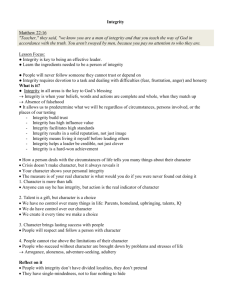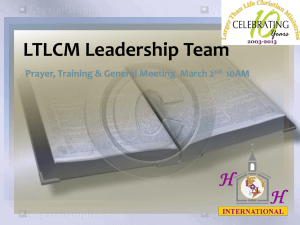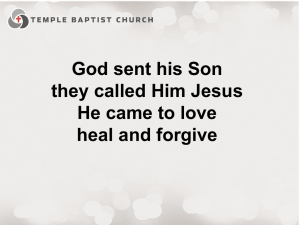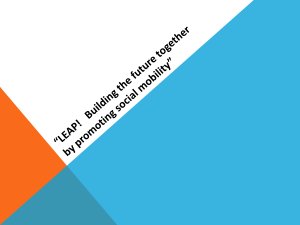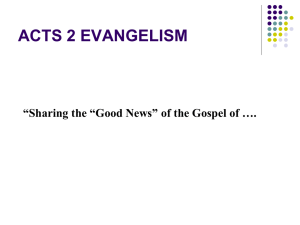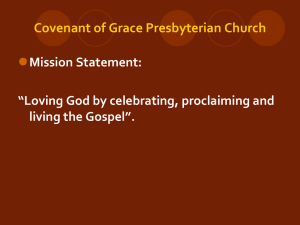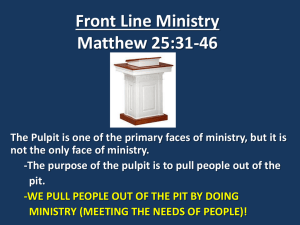Practical Biblical theology on serving the poor3
advertisement
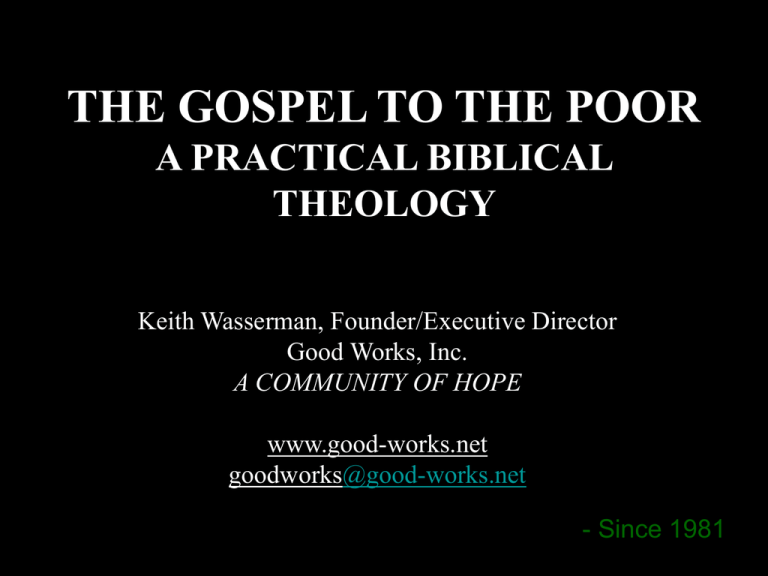
THE GOSPEL TO THE POOR A PRACTICAL BIBLICAL THEOLOGY Keith Wasserman, Founder/Executive Director Good Works, Inc. A COMMUNITY OF HOPE www.good-works.net goodworks@good-works.net - Since 1981 “Some people’s lives are like a revolving door” •We must ask “what is the most loving think we can do? We must realize “there is pain in loving others into the kingdom. “Developing a philosophy of ministry for long term kingdom thinking” 5 FOLD PHILOSOPHY OF MINISTRY • 1. BEING Worshipers • 2. Ministry with the WIDOW, the FATHERLESS and the STRANGER • 3. Ministry of discipleship • 4. Ministry in the neighborhood • 5. Ministry in/with the community What we DO emerges from who we ARE WORSHIP Matthew 6:33 • The ethic of inefficiency and the value of community • Our work is the offering of worship • Worship ‘lifts us’ to the place where we can hear “you are my beloved” • The gospel must be good news for us! • Reconciliation: Walk it out and talk it out • Laying your gift at the alter is not ‘figurative’ • The sin of Achan (Joshua 7) What’s your program? Our program is integrity. WORSHIP & COMMUNITY Colossians 1:9-14 • Being bitten surfaces issues of hurt, anger, resentment, bitterness and forgiveness. • Life-flowing ministry must grow out of our community • We invite the poor into what we are already doing (with or without them) • The power to share/release our “stuff” is found in community (Acts 2:44 & 4:32) • In community there is a check & balance system on our “power” • In community we can prevent burnout • In community, WE can speak for the voiceless (Proverbs 31:8-9 We can not see our neighbor properly except through the lens of worship – Matthew 9:35 What is your theology of Love? -Understanding our own power. -Developing & growing in the FEAR OF GOD. “To love a person is to invite them into your network of relationships, a community” –Jean Vanier LOVE AS… Luke 6:32-33 - Kindness Accountable love Merciful love Unwavering love Suffering love (pain) Flexible love Advocacy love - Discerning love Responsibility Commitment Motivational love Supportive love Empowering love A father’s love A mothers' love “We loved you so much that we were delighted to share with you not only the gospel of God but our lives as well” – I Thessalonians 2:8 What does mean when we want to serve the poor but we do not want to know the poor? Wesley on Face-to-face interaction with the poor “One great reason why the rich in general have so little sympathy for the poor is because they seldom visit them. Hence it is that . . . one part of the world does not know what the other suffers. Many of them do not know, because they do not care to know: they keep out of the way of knowing it-and then plead their voluntary ignorance as an excuse for their hardness of heart.” Sermon On Visiting the Sick Works:3:387-8. Would John Wesley join the Methodist Church? • A gospel for the gaps. A net for those who were falling through the cracks. • Methodists went to where the people were. They “sought out” the forgotten people. • Ministry beyond the local church was normative. • His faith was manifested in good works. • Eclectic – he took the best of many traditions. Job 29:1-18 • “I was a father to the fatherless” • “I made the widows heart sing” • “ I took up the case of the stranger” Do not oppress an alien, you yourselves know how it feels to be aliens, because you were aliens in the Egypt (NIV) - Exodus 23:9 “So give your servant a discerning heart to govern your people and to distinguish between right and wrong. For who is able to govern this great people of yours?” I Kings 3:9 • Wisdom (James 3:17-18) • Discernment (Hebrews 5:14) Principals of Discipleship -- a long obedience in the same direction -• 1. Jesus never called us to be Christians. He calls us to become and make disciples. • 2. Making disciples is the primary lens through which we view and do ministry with the poor. • 3. Training believers to grow in their wisdom, discernment and love for the poor means doing, reflecting, & redoing. • 4. Discipline. There is no discipleship without internal and external discipline. • 5. All disciples are Christians but are all Christians disciples? The continuum of success A window into Christian Maturity -- a long obedience in the same direction -- Viewing life redemptively World-view: able to say “the Lord gives…the Lord takes away, blessed be..” Conviction: The Lord will deliver us… but even if He doesn’t, we will still not …. Forgiveness: The grace to receive and give it both to ourselves and to others. What we do when we are alone. Matthew 7:24-27 How do you know what kind of house you are building? James 1:22-26 How do we know we are not deceiving ourselves? “For it is God’s will that by doing good you should silence the ignorance of foolish men” – I Peter 2:15 DOING FOR • - DOING FOR – project orientated. The power is usually on the side of the doer. We feel like the experts helping the powerless. A specific challenge is reached, a goal is met. The task is complete. We feel good about doing something good for someone else. These are measurable and often task orientated acts of service. These tasks open the door for a deeper relational life. Evangelism with the not-yet-Christians can be activated through this effort! Vs DOING WITH • DOING WITH – is much more emotionally and spiritually challenging and much more complex. This is relationally orientated and you are immersed into the life of a needy person. You are brought to prayer and you soon begin to understand how much you don’t know and how much you need the grace from God to BE in this relationship (WWJD). Your motives are examined by the Holy Spirit. You often feel inadequate and you find yourself reaching out for others council, advice and support. A small group is helpful at this point to “support you” as you walk with this VDP. This relationship “tests” your faith and reveals what fruit you have in your life to surface. You are forced to trust God in ways you have not had to in the past. You grow. The danger of insulation and the reality of our social circle. “… do not be proud but be willing to associate with people of low position” – Romans 12:16 • Teach the illiterate to read • Befriend the mentally ill • Become a friend to a child in a single parent family • Visit the elderly in your neighborhood • Volunteer your time at an agency serving the homeless • Volunteer with Hospice • Work at a crisis pregnancy center • Serve with Habitat for Humanity • Become a big brother/big sister • Provide transportation (give a ride) to someone How do you overcome evil? You overcome evil with good! Romans 12:21 Three Aspects of doing good: • 1. Love the stranger, fatherless, widow. - (Job 29:12-17) • 2. Recognize people’s suffering - (Exodus 6:9) • 3. Do not take the world’s point of view (James 1:27) Q –what might be an example of “being stained” by the world’s point of view of the widow and fatherless? “They only asked us to remember the poor; the very thing I was also eager to do” -Galatians 2:10 GOD GOES THE DISTANCE Lessons from John chapter 4 Internships @ Good Works • Since the late1980’s, Good Works has been providing both academic and non-academic internship opportunities. Our goal is to provide a context for discipleship to take place, educating people about the issues surrounding service to the poor and the oppressed. Our goal is to develop godly servant-leaders who can carry on the commands of Jesus to a lost and hurting society (See Matthew 9:35-38).
